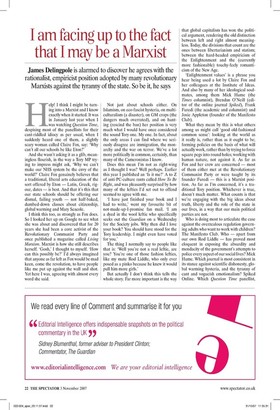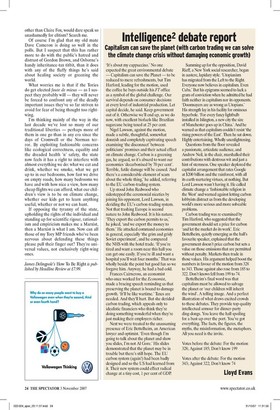I am facing up to the fact that I may be a Marxist
James Delingpole is alarmed to discover he agrees with the rationalist, empiricist position adopted by many revolutionary Marxists against the tyranny of the state. So be it, he says Help! I think I might be turning into a Marxist and I know exactly when it started. It was in January last year when I was watching Question Time, despising most of the panellists for their cant-riddled idiocy as per usual, when I suddenly heard one of them, a slightly scary woman called Claire Fox, say: 'Why can't all our schools be like Eton?'
And she wasn't asking it as a glib, meaningless flourish, in the way a Tory MP trying to impress might ask, 'Why we can't make our NHS system be the envy of the world?' Claire Fox genuinely believes that a traditional, liberal arts education of the sort offered by Eton — Latin, Greek, rigour, dates — is best. And that it's this that our state schools should be offering our dismal, failing youth — not half-baked, dumbed-down classes about citizenship, global warming and Mary Seacole.
I think this too, as strongly as Fox does. So I looked her up on Google to see what she was about and discovered that for 20 years she had been a core activist of the Revolutionary Communist Party and once published a magazine called Living Marxism. Marxist is how she still describes herself. 'Gosh,' I thought to myself. 'How can this possibly be?' I'd always imagined that anyone as far left as Fox would be mad keen, come the revolution, to have people like me put up against the wall and shot. Yet here I was, agreeing with almost every word she said.
Not just about schools either. On Islamism, on eco-fascist hysteria, on multiculturalism (a disaster), on GM crops (the dangers much overrated), and on hunting (rescind the ban) her position is very much what I would have once considered the sound Tory one. My one. In fact, about the only areas I can find where we seriously disagree are immigration, the monarchy and the war on terror. We've a lot more politically in common, certainly, than many of the Cameronistas I know.
Does this mean I'm not as right-wing as I thought I was? Well perhaps. Earlier this year I published an 'Is it me?' A to Z of anti-PC-culture rants called How To Be Right, and was pleasantly surprised by how many of the lefties I'd set out to offend seemed to agree with me.
'I have just finished your book and I had to write,' went my favourite bit of not-made-up-I-promise fan mail. 'I am a dyed in the wool leftie who specifically seeks out the Guardian on a Wednesday for the Society jobs. Why then did I love your book? You should have stood for the Tory leadership. I might even have voted for you.'
The thing I normally say to people like that is: 'Well you're not a real leftie, are you? You're one of those fashion lefties, like my mate Rod Liddle, who only ever posed as a pinko because he knew it would pull him more girls.'
But actually I don't think this tells the whole story. Far more important is the way that global capitalism has won the political argument, rendering the old distinction between left and right almost meaningless. Today, the divisions that count are the ones between libertarianism and statism; between the hard-headed empiricism of the Enlightenment and the (currently more fashionable) touchy-feely romanticism of the New Age.
'Enlightenment values' is a phrase you hear being used a lot by Claire Fox and her colleagues at the Institute of Ideas. And also by many of her ideological soulmates, among them Mick Hume (the Times columnist), Brendan O'Neill (editor of the online journal Spiked), Frank Furedi (the academic and columnist) and Josie Appleton (founder of the Manifesto Club).
What they mean by this is what others among us might call 'good old-fashioned common sense': looking at the world as it really is, rather than as it ought to be; forming policies on the basis of what will actually work, rather than by trying to force square pegs into round holes; working with human nature, not against it. As far as Fox and her crew are concerned — most of them either met at the Revolutionary Communist Party or were taught by its founder Furedi — this is a Marxist position. As far as I'm concerned, it's a traditional Tory position. Whichever is true, doesn't much matter. What counts is that we're engaging with the big ideas about truth, liberty and the role of the state in our lives, in a way that our main political parties are not.
Who is doing most to articulate the case against the overzealous regulation governing adults who want to work with children? The Manifesto Club. Who — apart from our own Rod Liddle — has proved most eloquent in exposing the absurdity and mendacity of the government's attempts to police every aspect of our social lives? Mick Hume. Which journal is most consistent in its stance against scientific dishonesty, global warming hysteria, and the tyranny of cant and vogueish emotionalism? Spiked Online. Which Question Time panellist, other than Claire Fox, would dare speak so unashamedly for elitism? Search me.
Of course I'm glad that my old mate Dave Cameron is doing so well in the polls. But I suspect that this has rather more to do with the public's hatred and distrust of Gordon Brown, and Osborne's handy inheritance-tax titbit, than it does with any of the fluffy things he's said about healing society or greening the world.
What worries me is that if the Tories do get elected faute de mieux — as I suspect they probably will — they will never be forced to confront any of the deadly important issues they've so far striven to avoid for fear of being thought too rightwing.
I'm thinking mainly of the way in the last decade we've lost so many of our traditional liberties — perhaps more of them in one go than in any era since the days of Cromwell or the Norman terror. By exploiting fashionable concerns like ecological correctness, equality and the dreaded health 'n' safety, the state now feels it has a right to interfere with almost everything we do: what we eat and drink, whether we smoke, what we get up to in our bedrooms, how fast we drive on empty roads, how many bedrooms we have and with how nice a view, how many cheap flights we can afford, what our children's view is to be on climate change, whether our kids get to learn anything useful, whether or not we can hunt.
If opposing the tyranny of the state, upholding the rights of the individual and standing up for scientific rigour, rationalism and empiricism makes me a Marxist, then a Marxist is what I am. Now can all those of my Tory MP friends who've been nervous about defending these things please pull their finger out? They're universal values, not exclusively right-wing ones.
James Delingpole's How To Be Right is published by Headline Review at £7.99.













































































 Previous page
Previous page